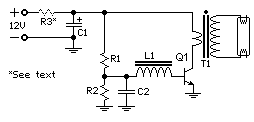
This 40W fluorescent lamp inverter allows you to run 40W fluorescent tubes from any 12V source capable of delivering 3A. This is basically a larger version of the 12VDC Fluorescent Lamp Driver and can be used to light regular or blacklight tubes.

| R1 | 1 | 180 Ohm 1W Resistor | |
| R2 | 1 | 47 Ohm 1/4W Resistor | |
| R3 | 1 | 2.2 Ohm 1W Resistor (only needed once) | |
| C1, C2 | 2 | 100uF 16V Electrolytic Capacitor | |
| C3 | 1 | 100nF Ceramic Disc Capacitor | |
| Q1 | 1 | TIP 3055 or 2N3055 or equivalent | |
| L1 | 1 | See "Notes" | |
| T1 | 1 | See "Notes" | |
| MISC | 1 | Wire, Case, Board, Heatsink For Q1, heatshrink, AM antenna rod for coil |
1. Wind L1/T1. You will need an
AM antenna rod that is about 60mm (2.5 inches) long to wind T1/L1 on. T1/L1 are
wound on the same core. Shrink a layer of heat sink over the core to insulate it. Leave 50mm of wire at each end of the coils.
Primary : Wind
60 turns of 1mm diameter enameled copper wire on the first layer and put a
layer of heat shrink over it.
Feedback: Wind 13 turns of 0.4mm enameled copper wire on the
core and then heat shrink over that.
Secondary: This coil has 450 turns of 0.4mm enameled copper
wire in three layers. Wind one layer and then heat shrink over it. Do the same
for the next two.

2. Calibrate/test the circuit. To calibrate/set up the circuit connect the 2.2 Ohm 1W resistor (R3) in series with the positive supply. Connect a 40W fluorescent tube to the high voltage ends of the transformer. Momentarily connect power. If the tube doesn't light immediately reverse the connections of L1. If the tube still doesn't work, check all connections. When you get the tube to light remove the 2.2 ohm resistor and the circuit is ready for use. You will not need R3 again.
3. This circuit is designed for 220V lamps. It will work with 120V units just fine, but will shorten the life of the tube.